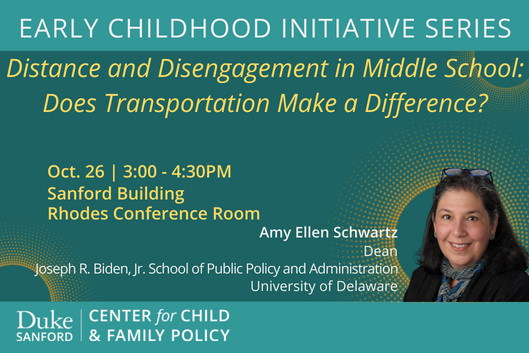
Disengagement among middle school students is a well-documented and widespread problem. The transition to middle school often results in decreased attendance and increased chronic absenteeism and suspensions. Disengagement in middle school has longer-term consequences, including increased high school dropout and delinquency, and substance abuse in later adolescence and early adulthood.
An underexplored explanation for disengagement is that students typically travel longer distances to attend middle school than elementary school. As distance to school increases, middle school students are more likely to rely on school buses or public transit to get to school, which may promote-or deter-engagement. On one hand, the school bus or free public transportation may increase engagement by reducing travel time, easing travel logistics and facilitating participation in after-school activities. Alternatively, transportation could reduce engagement if commutes are stressful or tiring or fraught with bullying or teasing. Whether-or to what extent-distance and transportation shape the engagement of middle school students are empirical questions which Dr. Schwartz and her colleagues aim to answer.
Amy Ellen Schwartz is dean of the Joseph R. Biden, Jr. School of Public Policy and Administration at the University of Delaware. Previously, she was the Daniel Patrick Moynihan Chair in Public Affairs at the Maxwell School of Citizenship and Public Affairs at Syracuse University where she was professor and chair of economics and professor of public administration and international affairs.
She is co-PI and director of transportation research for the IES-funded National Center for Research on Education Access and Choice. She serves on various editorial boards, including Regional Science and Urban Economics, PLOS-One, and Education Finance and Policy and was the editor of Education Finance and Policy from 2014-2019. She received her Ph.D. in economics from Columbia University.
Schwartz is a leading expert on the use of large-scale administrative micro-data sets for policy research, drawing on more than twenty years of collaborative research using detailed micro-data on New York City public school children, buildings, resources, neighborhoods, retail establishments and taxation.
Her research spans a broad range of topics in education policy and urban economics, focusing on the nexus of schools, neighborhoods and public services and the causes and consequences of children’s academic, social and health outcomes. Current IES-funded work examines the link between transportation, school choice, commuting and student outcomes using unique microdata on New York City public school children. Other work examines the impacts of housing (e.g. vouchers, public housing), neighborhood crime and special education, among others.
The Early Childhood Initiative seeks to bring together scholars to address early childhood challenges and produce world-class scholarship that will help maximize the potential of all children during their early years.
Please join us for a reception after the talk.